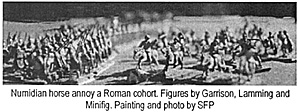 Numidian horse annoy a Roman cohort. Figures by Garrison, Lamming and Minifig. Painting and photo by SFP
Numidian horse annoy a Roman cohort. Figures by Garrison, Lamming and Minifig. Painting and photo by SFP
The horse the next day left camp, followed by the legiones and supports. Curio left five cohorts to guard the camp. The rest of the forces were committed to destroying Saburra. (CW II. 39. 1.) Saburra heard of advance and informed Juba who had never tamed back. Juba sent 2000 of his personal Spanish horse, to support Saburra, he then followed up with the Royal Army which included 60 Elephants (CW II 47. 7.) Saburra gave ground before the Roman cavalry advance, which was pushing him right back to Juba. This retreat was reported to Curio, and he urged the army to march faster, least Saburra escape. The headstrong, vain, Legatus was certain he had the enemy on the run after chasing him for 16 miles (CW 41.1.) Instead he was walking into Juba's well conceived trap. He left the high ground and descended into that graveyard of Roman legiones, Bagradas Valley.
This had been what Saburra was waiting for. With his Spanish horse he charged and routed the exhausted Roman horse, chasing them from the field. With no cavalry support, the legiones attempted to engage the Numidian infantry. They soon discovered their mistake.
"Wherever they attacked the enemy line they did, indeed, force the enemy to give ground, but they were unable to pursue them far or the cavalry spur their horses on strongly. The enemy horses, on the other band, began to outflank our line on both sides and trample our men down from behind. When some of our cohorts detached themselves from the line and charged, the Numidian infantry, being fresh, would get away thanks to their speed; then, as our men were returning to their lines, the horse would encircle them and cut them off. As a result, it did not appear safe for our men either to stand their ground in face of the missiles and keep in their ranks or to charge forward and try their fortune. The enemy's forces kept growing, as frequent reinforcements arrived from the king; our men's strength was sapped by exhaustion; and besides the wounded could neither leave the line nor be conveyed to a place of safety, since the whole army was surrounded and penned in by the enemy cavalry. They abandoned hope of survival, and, as men are wont to do in their last hours, either lapsed into self pity or asked for their relatives to be looked after, if fortune could rescue anyone from this peril. Fear and grief filled the whole army. (CW II.41.3-8) (BC II.45 2-4.)
Curio attempted to reorganize his lines, but the Romans could not stand in the face of the withering javelin fire, and they were cut off from the higher ground by the Numidian cavalry. The horror of the second Punic war had returned. As they had done at the Trebia, Lake Trasimano and Cannae, the dark faced warriors on the wiry ponies had separated the legiones into individuals and were killing them at their convenience. Several centurions asked Curio to save himself. He declared he could: "...never go and face Caesar after losing the army he had entrusted to him." He was killed shortly after this. (CW II.42.4)
The army broke up, trying to make for the high ground surrounding the valley. They never got there, like at Cannae and Zama the Spanish horse returned and forced them back into the killing ground. Caesar claims all the foot that accompanied Curio to the Bagradas were killed. (CW II. 42. 6.) Around 200 horse got away. "When defeat started to loom Asinius Pollio made his escape with the remaining horsemen to the camp at Utica, {Casta Cornelia) in case Varus concluded there had been a reverse over on the Bagradas, and attacked. (BC II.45.5)
The quaestor in command, Marcus Rufus realized he had to evacuate. However as his warships were gone he had to depend on the transports. With no war galleys to keep order, panic spread to the ramshackle fleet and many fled, while other were capsized by the many soldiers trying to get aboard. By daybreak the fleet had dispersed saving only a few of the troops, Rufus and Pollio were among them. (It was they who gave the above accounts to Caesar) The rest surrendered to Attius. They were disarmed and fraternizing with their fellow Romans when "Juba arrived, lined them up around the town wall and slaughtered them, saying he was finishing off his victory, and taking no notice of even Attius' protestations. In this way the two Roman legions which had sailed to Africa with Curio were completely lost, along with their cavalry and light armed support and their camp attendants, and Juba returned to his own territory on the belief that he had did Pompeius a very great service." (BC II.46.4.)
Africa would not be supplying grain to Caesar's Italy anytime soon. His overconfident legatus Gaius Scribonius Curio had seen to that. And the Bagradas had claimed another two legiones. It was the worst disaster in Africa to Roman arms since the first Bagradas 201 years previous.
More Curio in Africa 49 BCE
Back to Strategikon Vol. 1 No. 2 Table of Contents
Back to Strategikon List of Issues
Back to MagWeb Master Magazine List
© Copyright 2001 by NMPI
This article appears in MagWeb (Magazine Web) on the Internet World Wide Web. Other military history articles and gaming articles are available at http://www.magweb.com